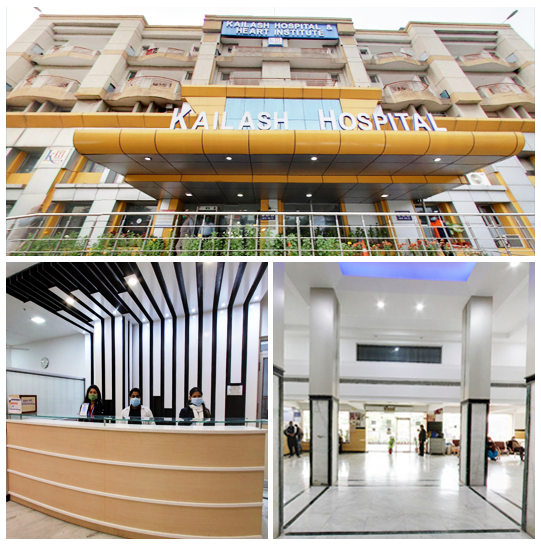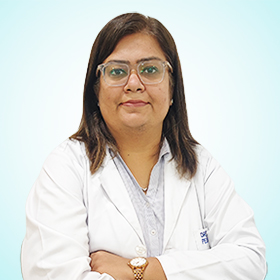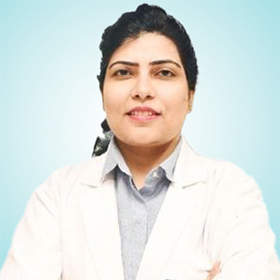

Paediatric Neurology (Kailash Hospital, Sector 27, Noida)
Neurological disorders in children arise from abnormalities in the brain, spine, nerves and muscles. The condition can vary from relatively simple disorders such as migraines to complex epilepsy or serious medical issues such as developmental delays, autism spectrum disorder or neuroregression disorders.
Children are either born with the disorder or may acquire it later in life as a result of traumatic injury or serious infection. All these chronic conditions require ongoing care and close follow-up throughout childhood and adolescence. With especially complex neurological issues, your child may be referred to a pediatric neurologist.
Our Department of Pediatric Neurology in Noida is equipped with the specialized facilities and knowledge to treat a broad spectrum of neuro disorders. We have a team of experienced pediatric neurologists who are experts in evaluating and managing complex and difficult to treat neurology issues starting from neonatal period till adolescent age group. Our pediatric neurology doctor offer personalized care tailored to each patient's unique needs.
We understand the unique challenges that children facing neurological issues may encounter. For children with long-term neurological ailments, our neurologists also provide regular care and counseling. Our tertiary pediatric neurology center uses the latest evidence-based treatments to provide the best possible outcome for our patients.
Cerebral Palsy
Cerebral palsy is a neurological condition that affects a person’s ability to move and maintain balance and posture. It occurs due to damage to the developing brain, most often before birth.
Autism spectrum disorder & ADHD
Autistic spectrum disorder is a complex neurodevelopmental condition involving persistent challenges with social communication, restricted interests and repetitive behavior. Children with Attention-deficit/hyperactivity disorder (ADHD) may have trouble paying attention, controlling impulsive behaviors or being overly active.
Epilepsy & Seizures
Epilepsy is a condition of the brain that is characterized by repeated seizures. A seizure may cause temporary, uncontrolled muscle movements and a loss of consciousness.
Brain Tumour
A pediatric brain tumor is the growth of abnormal cells within a child’s brain. A growing tumor can cause pressure on the brain and result in symptoms such as headache, nausea, seizures, etc.
Stroke
A stroke happens when blood supply to a part of the brain is interrupted, leading to brain injury. It can be caused by a blocked blood vessel or by bleeding in the brain.
Headache/Migraine
Migraine is a neurological condition involving recurrent, severe headaches often accompanied by nausea, vomiting, and sensitivity to light and sound.
Neuro-oncological disorder
Neuro-oncological disorders refer to a broad category of conditions that involve tumors or cancers within the nervous system. These can affect the brain, spinal cord, and peripheral nerves.
Head trauma with medical complications
Head trauma refers to any damage to the scalp, skull or brain caused by injury. Common symptoms include headache, nausea or vomiting, fatigue, memory or concentration problems, seizures, coma, paralysis and loss of coordination.
Neurogenetic disorder with metabolic disorder
Neurogenetic disorders arise from changes in genes and chromosomes, affecting the brain, nerves, spinal cord and muscles. A metabolic disorder occurs when something is wrong with the body’s metabolism. Symptoms include unexpected weight loss or gain, tiredness and decreased appetite.
Hydrocephalus
Hydrocephalus is a condition in which there is excessive buildup of cerebrospinal fluid in and around the brain. The buildup of fluid can exert pressure on the brain.
Multiple-sclerosis
Multiple-sclerosis is an autoimmune disease that attacks the central nervous system, causing episodes of neurologic symptoms such as weakness, numbness, tingling and difficulty balancing.
Neuro Infections
Infections affecting the central nervous system can pose serious risks, especially in children with compromised immune systems. Bacteria, fungi and viruses are the common causes of CNS infections.
Neuromuscular Disorders
Neuromuscular disorders encompass conditions that impair the nerves that control the muscles. A child with the disorder might experience muscle cramps, muscle pain and movement problems.
Developmental Delay
A developmental delay occurs when your child is slow to each one or more developmental milestones compared to their peers. It includes problems with language or speech, movement, social and emotional skills, and cognitive skills.
Neuroregression Disorders
Pediatric neuroregression disorder refers to a condition where a child starts to lose previously acquired developmental milestones or abilities.
Our pediatric neurology department offers a comprehensive range of services, from diagnosis, treatment to follow-up care. This includes:
Electroencephalogram (EEG) including prolonged EEG monitoring
EEG is a technique used to monitor the electrical activity of the brain. It is useful in diagnosing brain tumors, head injury, brain stroke, seizures, etc.
Electromyography (EMG)
EMG is a diagnostic test that evaluates muscle response or electrical activity in response to a nerve’s stimulation of the muscle.
Nerve Conduction Study (NCS)
NCS is used to check the rate at which nerves can send electrical signals. It identifies nerve and muscle problems.
Magnetic Resonance Imaging (MRI)
MRI is a medical imaging procedure that produces detailed pictures of the brain. It helps in evaluating and diagnosing several different medical conditions that affect the brain or other structures in the head.
Computed Tomography (CT) Scan
A CT scan of the brain is a non-invasive diagnostic imaging procedure that provides more detailed information about brain tissue and brain structures.
Sleep Studies
A sleep study is a diagnostic test that involves recording multiple bodily functions while you sleep.
Cerebrospinal Fluid Analysis
Analysis of cerebrospinal fluid (CSF) can help detect certain conditions and diseases. The test may look for proteins, sugar (glucose), opening pressure, etc.
Genetic Testing
Genetic testing identifies genetic changes that may be associated with various neurological conditions or disorders.
Neuro-rehabilitation
Neurological rehabilitation is a doctor-supervised program designed for children with diseases, injury, or disorders of the nervous system. It helps in improving function, reducing symptoms, and improving the well-being of children.
Botox administration
Botox or Botulinum Toxin therapy is the most effective treatment for neurological disorders, including dystonias, spasticity from strokes, multiple sclerosis and brain injuries, etc.
Renowned for cutting-edge facilities and unwavering commitment, Kailash Hospital is dedicated to delivering the highest quality care to patients. Equipped with advanced imaging and diagnostic technologies, we provide comprehensive evaluations and precise diagnoses of various neurological disorders. Understanding the distinct needs of each patient, we develop customized treatment plans, tailored to address specific challenges. Parents can trust our expertise when seeking treatment for their children with neurological conditions.
Team of Doctors
© 2025 Kailash Healthcare Ltd. All Rights Reserved












